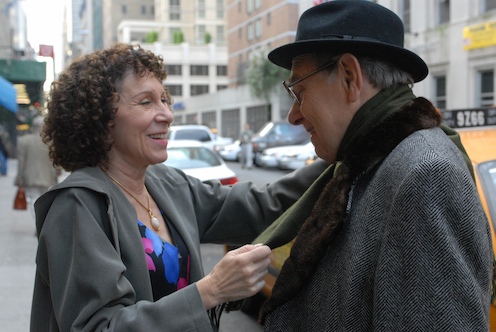Love Comes Lately

Full Description
“Literature has neglected the old and their emotions,” the Yiddish writer and Nobel Prize winner Isaac Bashevis Singer wrote. “The novelists never told us that in love, as in other matters, the young are just beginners and that the art of loving matures with age and experience.” Love Comes Lately evokes Singer in word, spirit and deed in an utterly winning film by Jan Schütte. It revolves around a quintessential Singer character, Max Kohn, the elderly, self-centered but gentlemanly writer from his story “The Briefcase,” and weaves in two other Singer stories, “Old Love” and “Alone,” as products of Kohn’s merciless pen.
At the stage of his career when the lecture circuit consists of college literary clubs and synagogues, Max lives “in a state of permanent confusion,” enhanced by a vivid imagination that has his dream life merging with his waking, and both with his fictions. But this is not an old man we can write off as the sum of his foibles. As portrayed by the Viennese actor Otto Tausig, Max is haimish and sophisticated, and, despite his prostate worries, vital. Hence, the magnetism he holds for his “invisible harem,” the women, real or imagined, who gravitate toward him, even as he enters his dotage. There is his steady girlfriend and enabler Reisel (Rhea Perlman); a former student, Rosalie (Barbara Hershey), who threw him over for Kafka; and the fictional Ethel (Tovah Feldshuh) and Esperanza (Elizabeth Peña), women who carry a complex of bizarre fears into Max’s comical world.
Many of Berlin-based director Jan Schütte’s award-winning films—including Bye Bye America (SFJFF 1995)—have explored the territory of exile. Here, Schütte’s direction and a superb cast honor an ineffable quality of Singer’s writing—Yiddish translated into its American idiom, where it will never be quite at home. Therefore, no one here is particularly concerned with realism, but rather with expressiveness, and the character(s) it creates. If you were thinking early Woody Allen, you’d be on to something.
Filmmaker Bio(s)
From 2008 Festival: Director, Austria
Jan Schütte studied Literature, Art History and Philosophy and began making movies in 1982. His first feature length film Dragon’s Chow (1987) premiered at the Venice Film Festival.
Schütte went on to develop his unique vision in features such as Winckelmann’s Travels (which premiered at the 1990 Venice Film Festival) and Bye Bye America (which premiered at the 1994 Cannes Film Festival). Fat World was released by Polygram in 1998, his biopic of Bertold Brecht, The Farewell, premiered at the Cannes Film Festival in 2000. With Supertex (2003) Schütte directed a film based on a novel by Leon De Winter.
Schütte has won numerous awards including the Premio Cinecritica at Venice and the Prix Franois Truffaut and his films have been released worldwide.
Jan Schütte was a visiting professor at Harvard University from 2005-2006 and has been running the Master class Ludwigsburg-Paris, a program for young European producers, together with Peter Sehr since 2001.
In 2002 Schütte, along with Martin Scorsese, Abbas Kiarostami and Tilda Swinton, was member of the jury at the Cannes Film Festival.
He currently lives in Berlin with his wife Cristina Szápáry and four children.
DIRECTOR’S FILMOGRAPHY
2007 – LOVE COMES LATELY
2003 – SUPERTEX
2001 – OLD LOVE
2000 – THE FAREWELL
1998 – FAT WORLD
1995 – A VOYAGE INTO THE INNERMOST OF VIENNA
1994 – BYE BYE AMERICA
1991 – TO PATAGONIA
1990 – WINKELMANN’S TRAVELS
1988 – LOST IN AMERICA
1987 – DRAGON’S CHOW
Director(s)
Country(ies)
Language(s)
Release Year
Festival Year(s)
Running Time
86
Cast
